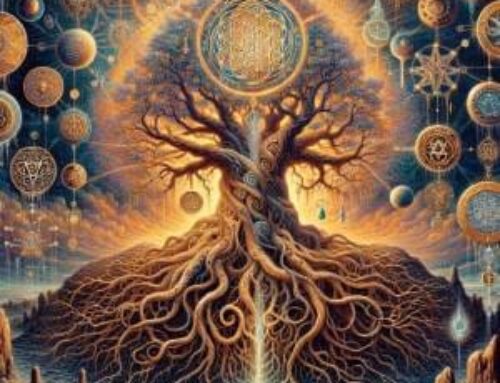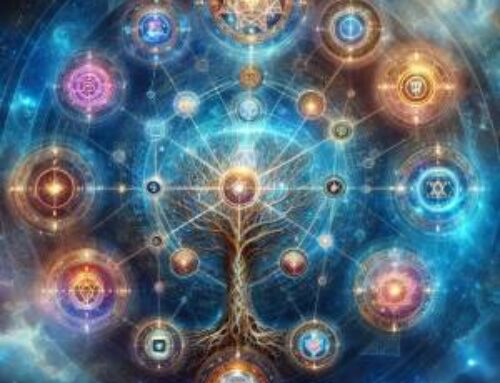Contents
- 1 Hermetism & Occultism
- 2 Occultism: Exploring the Hidden
- 3 The Seven Hermetic Principles
- 4 Hermetism and Occultism in Modern Practice
- 5 Integration into Daily Life
- 6 Personal growth and transformation
- 7 Community & Exchange
- 8 Practical Application
- 9 In conclusion,
- 10 The Role of Community on the Spiritual Path
Hermetism & Occultism
Hermetism is a spiritual, philosophical, and esoteric tradition that originates from the writings of Hermes Trismegistus. This tradition encompasses a wide range of beliefs and practices, including alchemy, astrology, and theurgy. The pursuit of hidden knowledge about the universe, nature, and human existence lies at the core of Hermetism. Its ultimate aim is to achieve a deeper connection with the divine.
Hermetism’s origins can be traced back to antiquity, with most of its foundational texts, known as the Hermetic Corpus, composed in Greece in the first century AD. These texts contain dialogues between Hermes Trismegistos and various disciples on philosophical, spiritual, and cosmological topics. They reflect a synthesis of Greek, Egyptian, and Christian beliefs. Hermetism was particularly popular during the Renaissance, as scholars and philosophers began to rediscover and study ancient texts, leading to a renewed interest in Hermetic teachings.

The relationship between Hermetism and the pursuit of universal knowledge is fundamental to comprehending this tradition. Hermetics’s maintain that there is a solitary universal truth that serves as the foundation of all aexistence, and this truth can be apprehended through the unification of mind and matter, heaven and earth, human and divine. This quest for knowledge is not solely intellectual but also spiritual, encompassing self-transformation and enlightenment regarding the genuine nature of reality. Hermetic practices, such as meditation, rituals, and the interpretation of symbols, aim to reveal deeper truths and guide practitioners on the path to gnosis, or direct knowledge of the divine.
Hermetism is a complex and multifaceted tradition dedicated to exploring the hidden knowledge of the universe and attaining deeper spiritual truth. The teachings provide a framework for personal transformation by uniting the mind and body, leading to enlightenment and a greater comprehension of the cosmic order.
Occultism: Exploring the Hidden
Occultism refers to the study and practice of hidden sciences and arts, with the aim of understanding and influencing aspects of reality beyond the reach of normal senses or scientific explanation. This includes a variety of disciplines such as magic, alchemy, astrology, and spiritual mediation. Occultism is distinct from other spiritual paths in its emphasis on the esoteric, secret, and often supernatural, as well as its methods and practices aimed at preserving and transmitting hidden knowledge.
Unlike many religious or spiritual traditions that focus on faith, dogma, or the worship of a higher power, occultism prioritizes personal experience, experimentation, and learning techniques to explore the hidden aspects of reality. By understanding and applying these laws, individuals can gain extraordinary insights and abilities.
Occultism is the belief in hidden laws that govern the universe. The role of occultism in history is complex and layered. In antiquity and the Middle Ages, occult practices were often closely linked with science and medicine, as understanding nature and its secrets was seen as a unified field. During the Renaissance, occultism experienced a revival due to the renewed interest in Hermetic and Neoplatonic ideas. In the 19th and early 20th centuries, this interest in spiritual and esoteric subjects led to the founding of occult societies such as the Hermetic Order of the Golden Dawn and the Theosophical Society. These societies had a significant influence on the culture and spiritual quest of the time.
Occultism remains an influential part of the spiritual landscape in the modern world, although it is often misunderstood. It is expressed in various subcultural movements, popular culture, and the continued practice of groups and individuals dedicated to the occult arts. For many, occultism offers a path to personal transformation, exploration of life’s mysteries, and the search for deeper meaning in an increasingly materialistic world. Despite the controversies and skepticism often directed towards it, occultism remains a fascinating field that expands the boundaries of knowledge and human experience.
The Seven Hermetic Principles
The Seven Hermetic Principles are a collection of esoteric writings that summarize Hermetic philosophy and provide a framework for understanding the universe and personal development. These principles are universal laws that govern the material and spiritual world, showing ways to live in harmony with them.
1.The Principle of Mentalism states that everything is mental and that the universe is mental. This principle posits that all of reality is mental in nature, and that our consciousness is the foundation of the material world. To apply this principle, one can consciously control their thoughts to influence reality. Practical tools such as positive affirmations and visualizations can be used to bring about desired changes in life.
2.The Principle of Correspondence states that what is true on one level of existence is also true on all other levels. As above, so below; as within, so without. This principle demonstrates the correlation between different levels of existence. What occurs on the spiritual level is reflected in the physical world. To apply this principle, one can work on their inner world through self-reflection and meditation, which can lead to positive changes in their outer life.
3.The Principle of Vibration states that everything in the universe is in constant motion and vibrates. This principle states that all things in the universe are in motion, and differences in the material world are due to varying vibrational frequencies. To improve experiences and encounters in life, one can raise their vibrational frequency through positive thoughts, feelings, and a healthy lifestyle.
4.The Principle of Polarity explains that everything is dual, with opposites being identical in nature but different in degree. This principle teaches that everything has two poles, and opposites are actually two extremes of the same thing. By learning to accept and harmonize the polarities in life, one can overcome conflicts and lead a more balanced life. Understanding that every challenge also contains an opportunity is a practical expression of this principle.
5.The Principle of Rhythm states that everything flows, comes and goes; everything has its tides. This principle states that life follows a rhythmic cycle, a constant flow of back and forth. By accepting and working with the natural cycles of life, rather than against them, one can find stability amidst change. Consciously planning activities in harmony with natural and personal cycles is a way to utilize this principle.
6.The Principle of Cause and Effect: Every cause has its effect; every effect has its cause. This principle explains that nothing happens by chance and that everything in the universe is connected through this law. By acting consciously and taking responsibility for one’s choices, one can shape one’s life.
7.The Principle of Gender states that both masculine and feminine qualities are present in all aspects of creation. By balancing these aspects within ourselves, we can lead a more harmonious and productive life. It is important to maintain a balanced perspective when integrating these energies into daily life.
These principles offer deep insights into the workings of the universe and provide guidance for personal growth and improvement. Understanding and applying the seven Hermetic principles can lead to a more conscious and fulfilling life, both in personal relationships and the workplace.
Hermetism and Occultism in Modern Practice
In modern times, Hermetism and occultism have undergone a revival as individuals seek deeper spiritual knowledge and personal transformation. These ancient wisdom traditions provide tools and perspectives that resonate well in today’s fast-paced and often materialistic world. People turn to these paths to find answers to existential questions, expand their consciousness, and lead a more fulfilling life.
Integration into Daily Life
Practitioners of Hermetic and occult principles integrate them into their daily lives through meditation, rituals, studying mystical texts, and applying laws such as the law of attraction. These practices help to sharpen awareness, strengthen intuition, and establish a deeper connection to the universe. By consciously applying these principles, individuals can influence their reality and bring about positive changes in their lives,
Personal growth and transformation
Hermeticism and occultism emphasize self-perfection and enlightenment through techniques such as alchemy (a metaphorical process of inner transformation) and theurgy (connecting with the divine). These processes promote healing, overcoming personal limitations, and developing spiritual abilities. A proven path of initiation leads the spiritual aspirant safely to the goal.
Community & Exchange
In the modern world, individuals often seek support and exchange in online communities, workshops, and spiritual groups. These communities provide a space for discussions, sharing experiences, and collective rituals, creating a sense of belonging and an expanded understanding of spiritual paths. In traditional mystery schools, such as the Hermetic Academy, teachers pass on partly hidden (occult) knowledge to their students.
Practical Application
Practitioners apply Hermetic and occult principles to overcome challenges in life, whether through magical work to achieve specific goals or using astrology and tarot for decision-making and self-reflection. These tools allow individuals to explore life’s mysteries and find practical solutions to their problems.
In conclusion,
modern Hermetism and occultism offer a wealth of wisdom and techniques for those seeking spiritual growth and personal development. By applying these ancient teachings, modern seekers can gain a deeper understanding of themselves and the universe, leading to a more meaningful and fulfilled life.
The Role of Community on the Spiritual Path
Community plays a crucial role on the spiritual path by providing support, guidance, and fostering personal growth and development. In a community of individuals with similar interests, one can find motivation and inspiration. Teachers can share valuable knowledge and wisdom from centuries-old traditions. These relationships can help deepen one’s spiritual practice and strengthen the connection to the higher self.
The Hermetic Academy is an excellent example of such a community. It imparts deep esoteric knowledge and offers a space where spiritual seekers can meet, exchange ideas, and learn from each other. The Hermetic Academy provides support for individuals to unlock their full potential and pursue their path of spiritual enlightenment. For those committed to continuing their spiritual journey, the Academy offers a wealth of resources and a community that accompanies them every step of the way. Visiting the website can be the first step towards profound transformation and expansion of personal spiritual understanding.





